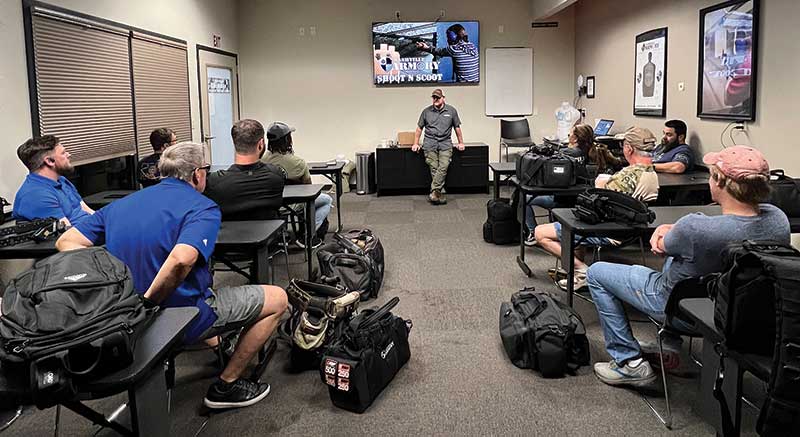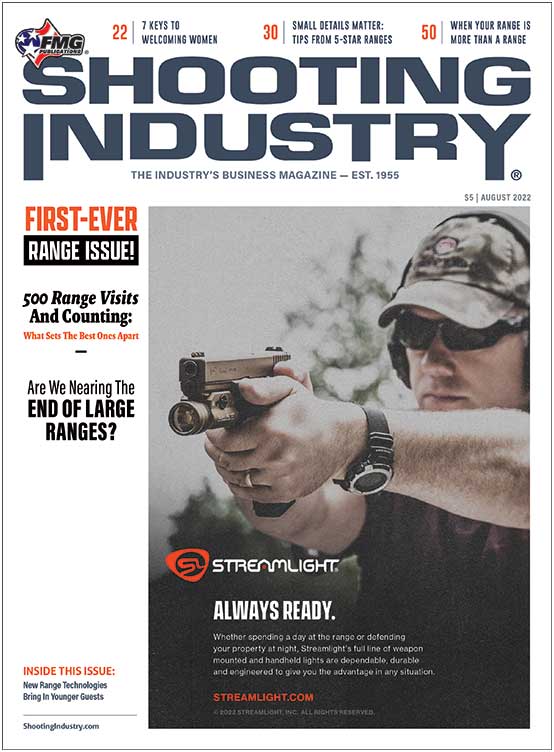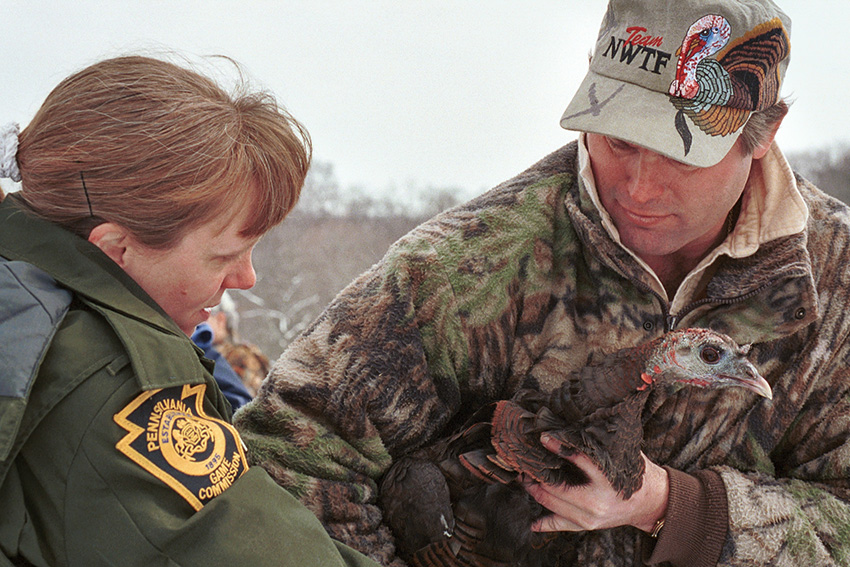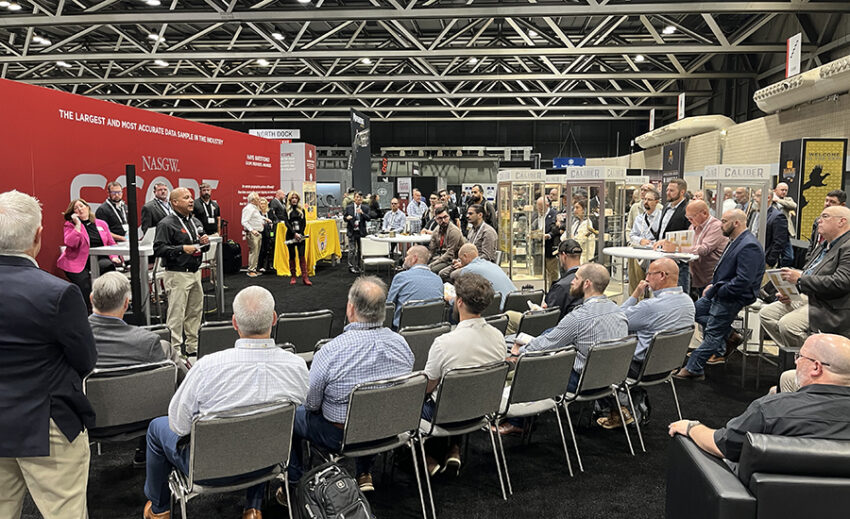Friendly Competition:
Hosting Range Events
Twice a month, dozens of customers gather on the range at Nashville Armory for a bit of friendly competition. These are the nights when the Tennessee store puts on its popular Shoot N Scoot events — a Tuesday night affair for pistols and a newer Thursday night program for rifles.
Each of the events is designed to stress and test a range of shooting skills — most of which are applicable to self-defense and concealed-carry situations. But they also represent a chance for the store to build long-term relationships with these customers.
For General Manager Jason Edgley, these Shoot N Scoots aren’t about making money. (At least not on a per-event basis.)
“It’s a give-back to our customers,” he elaborated. “We want them to have a great time and come back.”
For Nashville Armory and other shops around the country, using a range for regular competitions and special events can provide significant benefits. They have the potential to boost revenue streams. Even more, they create bonds with customers, who are given yet another reason to keep coming back. They may even be one of the keys to turning some first-time buyers into firearms enthusiasts.
More Than Punching Holes In Targets
Nashville Armory offers a glimpse into what’s possible for any range entertaining the idea of offering some sort of range competition. Shortly after opening in 2012, the shop started with an official IDPA match. Over time, they decided to go a different direction and invent a game of their own.
“We really wanted to be our own governing body,” Edgley stated. “This is the driving force for Shoot N Scoot.”
In this sense, any shop is limited only by the imagination of its management and employees. There are numerous “official” games to choose from, including International Defensive Pistol Association (IDPA), United States Practical Shooting Association (USPSA), GLOCK Sport Shooting Foundation (GSSF) and Steel Challenge Shooting Association (SCSA).
Another approach: Come up with a game that best fits your own range, business goals and customer base. Shoot N Scoot has certainly been a hit with Nashville customers. In the early days, they were shutting down half the range for a dozen or so participants. These days, the crowd regularly tops 50 (at $25 a person) and consumes the entire range.
At the end of each year, Nashville Armory offers prizes for the top three finishers in two divisions (irons and optics), with a couple of guns handed out last year. More than anything, Edgley sees it as a chance to reinforce basic gun skills for customers, who are faced with scenarios (or stages) emphasizing various aspects of self-defense shooting.
“It’s hard to talk about Shoot N Scoot without using the word ‘competition,’ but it’s not what it’s all about,” he said.
Centennial Gun Club, southeast of Denver, uses its range for a variety of events, including a monthly bowling-pin night, steel challenge (with .22 LR) and a new USPSA match. They also offer GSSF matches a few times a year, along with special events, including a night bowling-pin match using blacklights and glow-in-the-dark pins.
Much of it is geared toward the idea of adding extra value to range memberships (discounts are offered for most of the events.) But these competitions can also serve to help newbies connect with the gun community, said Joey Mizufuka, Centennial sales manager and instructor.
Instead of just seeing a new gun as something to stick in the bedside table, they start to see other possibilities.
“It opens up their eyes to the idea guns are for sporting purposes,” Mizufuka argued.
“Come up with a game that best fits your own range, business goals and customer base.”
At Ultimate Defense Firing Range & Training Center in St. Peters, Mo., regular events include a bowling-pin night and silhouette league (using small metal targets, including a ram and turkey.)
“When you shoot them, they really fly off the table,” said Paul Bastean, managing director, noting dynamic action is key to all of their competitions.
“It’s not just punching holes in targets. When you shoot, something happens. And the customers love it,” he added.
To encourage repeat competitors, Ultimate Defense has a monthly contest where scores on a particular target (in December it’s a Christmas tree, for example) earn entries for a gun giveaway. One key for success, Bastean said, is not skimping on the rewards. Consider when the shop got its first two GLOCK 44s, one of them went into the gun-of-the-month contest.
“The prizes we give away are all good prizes. It’s not just garbage we can’t sell,” he explained.
“A Lesson Learned”
When you start thinking outside the box, you’ll quickly realize not everything is going to work. The more creative you get, the more chances you give yourself to say something along the lines of: “We’re never going to do that again.”
Ultimate Defense has a couple of those stories, both with an autumn theme. The first was the time they decided to have a contest where participants would be judged based on the quality of faces they could shoot onto a jack-o’-lantern target.
Turns out it takes several hundred rounds to get a decent face.
And then there was the time they bought a bunch of pumpkins and offered them up to shooters. Two days of power washing to clean up the mess left Bastean with a simple conclusion: “It was an astronomical mistake.”
Mizufuka at Centennial Gun Club remembers when they first tried their .22-caliber steel challenge event. They underestimated the potential for damage from deflected fragments. This fact was brought home squarely when a ricochet took out one of the range sprinkler heads, drenching the place.
“A lesson learned,” he laughed. “So, I built a wooden barrier that’s easy to set up to catch the splatter.”
Both ranges have adjusted their bowling-pin contests. Mizufuka changed the format — moving from heads-up matches to simple time-based scoring. Some competitors weren’t all that fond of going against the top shooters in direct contests.
Ultimate Defense switched to plastic pins. “You don’t get splinters off plastic pins,” Bastean explained. “There’s just not as much mess.”
“Using a range for regular competitions and special events can provide significant benefits. They have the potential to boost revenue streams. Even more, they create bonds with customers, who are given yet another reason to keep coming back.”
In Nashville, the biggest adjustment they’ve made is in how Shoot N Scoot runs. In a typical IDPA or USPSA match, everyone shows up at the same time and waits for their turn to shoot each of the stages. A match can easily take three or more hours to complete.
Now, Nashville offer signups for three different one-hour blocks, allowing participants more control over how much time they are dedicating to the match.
“They can stick around as long as they want. But now, it’s not a forced function,” Edgley said. “You’re here maybe an hour and a half.”
What’s In It For Me?
There are different ways to approach these sorts of events. Making money directly from them may be a challenge (particularly in the early days) once you factor in employee time, potential lost range revenue, supplies and prizes.
For some ranges, the idea of turning competitions into a solid revenue stream never even enters the equation. Edgley is in it for relationship building — and doing his part to educate and train his customers.
“We’re providing them with a safe venue to practice certain skills you usually only do at an outdoor range,” he said, while noting most of his urban customers don’t have easy access to an outdoor facility.
Each month he sees evidence the plan is working. At least half the people at each match are regulars. But he sees five to 10 new faces in each group. Invariably, some of those return for future matches.
“From the beginning, we accepted we weren’t going to make much money off this, but we wanted to generate repeat customers,” he said.
These are the same people who end up buying guns, ammo and other accessories. And in recent years, the matches have turned profitable, allowing the shop to upgrade the range and targets.
It’s a similar story at Centennial in Colorado.
“Does it make money? I think we’re lucky to break even,” Mizufuka said. “But it’s for our members. We want to give them something to do.”
They also help generate traffic, he said: “Since I brought back USPSA matches, I’m getting more people in the store who are interested in the competition gear we carry.”
Still, this doesn’t mean there isn’t money to be made.
At Ultimate Defense in St. Peters, Bastean estimates they bring in an extra $2,000 to $2,500 a month from the various contests.
“The first benefit of these events is they drive traffic. The second benefit is they make money,” he said.
The boost is seen elsewhere as well. They sell more ammo, range bags, optics, magazines and loading devices. They watch shooters come in off the range asking for electronic hearing protection, so they can take part in the social aspect of the events. Then there are the guns.
“People want to buy whatever the winner was shooting,” he said.
For shops that aren’t seeing robust range use, these competitions can also help to jumpstart activity. Bastean suggests moving away from the Field of Dreams model, thinking if you build a range, “they will come.”
“It doesn’t work that way,” Bastean noted. “People need to be engaged and entertained.”





